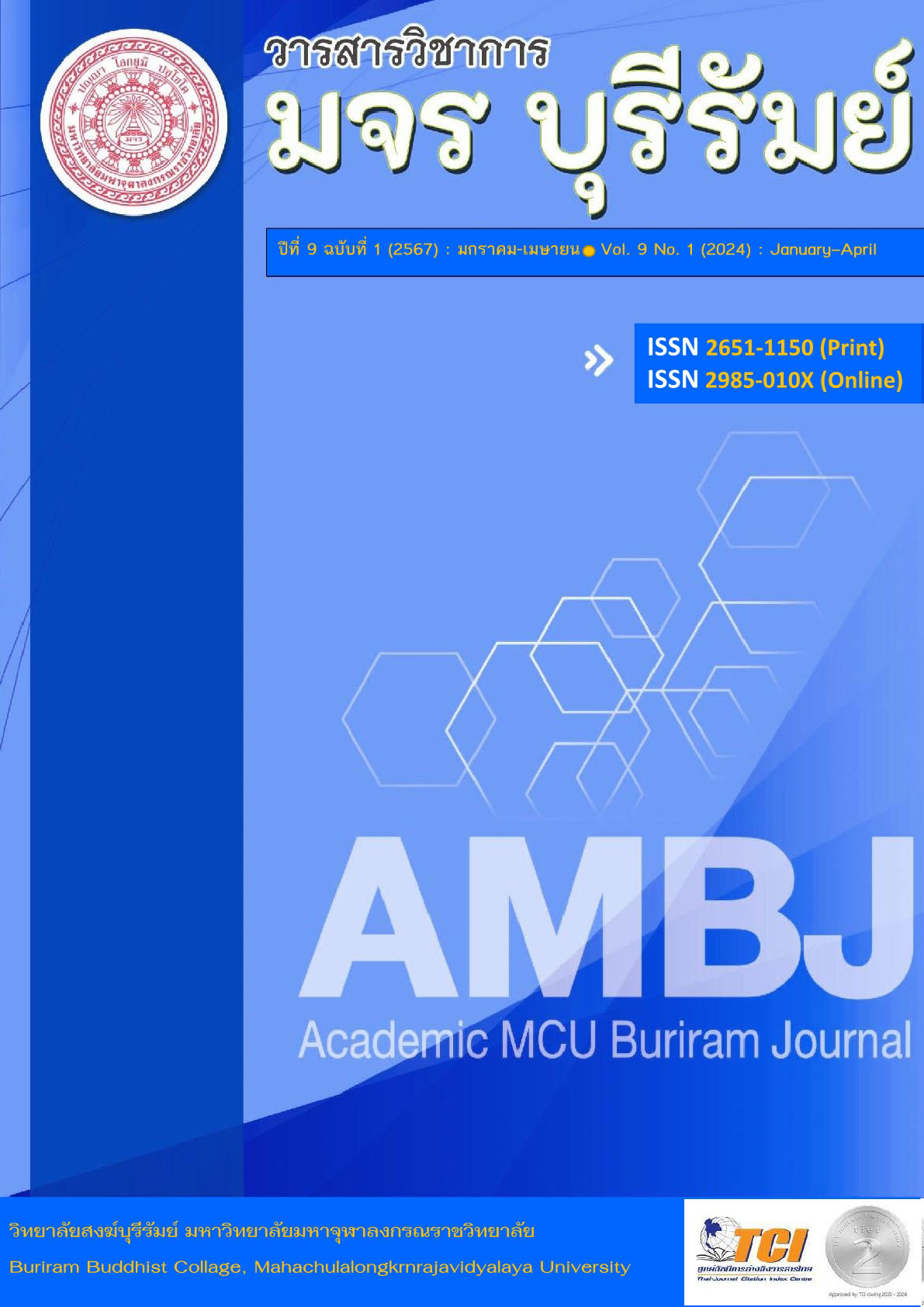The Guideline of Application for Buddhist Principle for Administration of Phrapariyatthidhamma School, General Education Section of Buriram Province
Keywords:
The Application, Buddhadhamma, School administration, General Education DepartmentAbstract
The purpose of this research were: 1) study the state of administrative problems in Phrapariyattham schools. General Education Department Buriram Province 2) Study the principles of Buddhism in the administration of Phrapariyattidhamma School. General Education Department Buriram Province and 3) study guidelines for applying Buddhist principles in the administration of Phrapariyattidhamma School. General Education Department Buriram Province. It is qualitative research. The sample group was personnel and those involved in Phra Pariyattham School. General Education Department Buriram Province, totaling 44 people. The research instrument used a semi-structured interview form. Then the research results are presented using descriptive analysis.
The research result found that:
1. Situation of management problems in Phrapariyattidhamma School General Education Department Buriram Province Can be divided into 3 areas: 1) academic administration problems, 2) teaching and learning problems, 3) curriculum improvement and development problems.
2. Buddhist principles in the administration of Phrapariyattidhamma School, General Education Department Buriram Province consists of 1) Attha principles 3, 2) Iddhipada principles 4, 3) Phala principles 4, and 4) Truth principles 5.
3. Guidelines for applying Buddhist principles in the administration of Phrapariyattidhamma School. General Education Department Buriram Province as follows: educational institution administrators, teachers, students, teaching and academics The 4 principles of Iddhipada should be applied. They are most satisfied with their studies. Remind yourself in your studies to be diligent in your studies. Be passionate about your studies. Along with the 5 principles of truth, take responsibility for your duties. Do not abandon the work that you are responsible for. Focus on creating benefits for yourself and others. In terms of improving and developing the curriculum, use the 5 principles of physical education. Have faith in choosing to improve and develop the curriculum and develop learning media to strengthen faith in deep learning in the subject. To bring the ability to control oneself to create wisdom and complete consciousness. And it is a power that will help make operations or activities feel confident. Current benefits Focus on developing the educational curriculum in educational subjects to be modern. And it is a learner-focused curriculum because it will make students interested, leading to maximum benefits and affecting success according to the goals set.
References
กลุ่มโรงเรียนพระปริยัติธรรม แผนกสามัญศึกษา กลุ่มที่ 11. (2563). ประวัติความเป็นมา. รายงานการประชุมคณะกรรมการบริหารกลุ่มโรงเรียนครูและบุคลากรทางการศึกษา. สำนักงานกลุ่มโรงเรียนพระปริยัติธรรม แผนกสามัญศึกษา กลุ่มที่ 11.
ธฤษิดา แก้วภราดัย. (2562). ศึกษาความสัมพันธ์ระหว่างพละ 5 กับอิทธิบาท 4. วิทยานิพนธ์พุทธศาสตรมหาบัณฑิต สาขาวิชาพระพุทธศาสนา. บัณฑิตวิทยาลัย: มหาวิทยาลัยมหาจุฬาลงกรณราชวิทยาลัย.
พระครูสุรัตโนภาส (ชูศักดิ์ จนฺทธมฺโม). (2561). ศึกษาการบริหารงานวิชาการตามหลักอริยสัจ 4 โรงเรียนสังกัด สํานักงานเขตพื้นที่การศึกษาประถมศึกษา อำเภอบางเสาธง จังหวัดสมุทรปราการ. วิทยานิพนธ์พุทธศาสตรมหาบัณฑิต สาขาวิชาพุทธบริหารการศึกษา. บัณฑิตวิทยาลัย: มหาวิทยาลัยมหาจุฬาลงกรณราชวิทยาลัย.
พระพรชัย สุกธมฺโม (ประสิทธิ์ สุขสันต์). (2554). ผู้นำเชิงพุทธกับการจัดการอคติ = Buddhist Leaders and Bias Management. ใน รวมบทความประชุมวิชาการทางพระพุทธศาสนานานาชาติ ครั้งที่ 8 เนื่องในวันวิสาขบูชา วันสำคัญสากลของโลก 12–14 พฤษภาคม 2554 ประเทศไทย. กรุงเทพมหานคร: 21 เซ็นจูรี่.
พระพรหมคุณาภรณ์ (ป.อ.ปยุตฺโต). (2545). ธรรมนูญชีวิต. พิมพ์ครั้งที่ 4. กรุงเทพมหานคร: โรงพิมพ์กรมศาสนา.
พระพรหมมุนี (พิมพ์ ธมฺมธโร). (2505). สากลศาสนา ภาค 1-2. กรุงเทพมหานคร: โรงพิมพ์มหามกุฎราชวิทยาลัย.
ไพบูลย์ ตั้งใจ. (2554). ประสิทธิภาพในการปฏิบัติงานของพนักงาน ตามหลักอิทธิบาท 4 กรณีศึกษา บริษัท แอมพาสอินดัสตรี จำกัด อำเภอเมือง จังหวัดสมุทรปราการ. วิทยานิพนธ์พุทธศาสตรมหาบัณฑิต สาขาวิชาการบริหารจัดการคณะสงฆ์. บัณฑิตวิทยาลัย: มหาวิทยาลัยมหาจุฬาลงกรณราชวิทยาลัย.
มหาจุฬาลงกรณราชวิทยาลัย. (2539). พระไตรปิฎกภาษาไทย ฉบับมหาจุฬาลงกรณราชวิทยาลัย. กรุงเทพมหานคร: โรงพิมพ์มหาจุฬาลงกรณราชวิทยาลัย.
ราชันย์ ศรีดา และธีรชัย บุญมา. (2564). การจัดการเรียนรู้ที่เน้นผู้เรียนเป็นสำคัญของครูสังคมศึกษาโรงเรียนพระปริยัติธรรม แผนกสามัญศึกษา จังหวัดอุบลราชธานี. วารสาร มจร อุบลปริทรรศน์, 6(1), 277-290.
สำนักกรรมาธิการ 2 สำนักเลขาธิการสภาผู้แทนราษฎร. (2560). การศึกษาของคณะสงฆ์พร้อมร่างพระราชบัญญัติการศึกษาพระปริยัติธรรม. รายงานของคณะกรรมาธิการขับเคลื่อนการปฏิรูปประเทศ. สำนักเลขาธิการสภาผู้แทนราษฎร.
Downloads
Published
How to Cite
Issue
Section
License
Copyright (c) 2024 Academic MCU Buriram Journal

This work is licensed under a Creative Commons Attribution-NonCommercial-NoDerivatives 4.0 International License.
ทัศนะและความคิดเห็นที่ปรากฏในบทความวารสารฉบับนี้ถือเป็นความรับผิดชอบของผู้เขียนบทความนั้น ไม่ถือเป็นทัศนะและความรับผิดชอบของบรรณาธิการ





